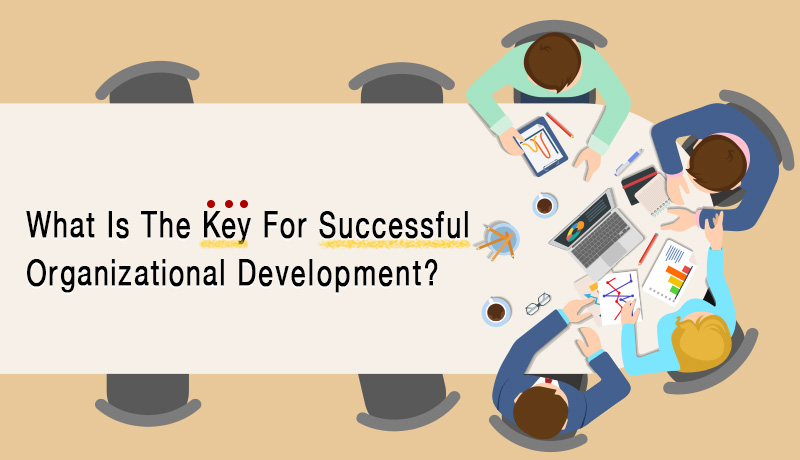Coach's VIEW is a business column authored by executive coaches in COACH A, aimed at providing valuable insights and effective approaches for leveraging coaching to foster organizational and leadership development. The column draws on the latest coaching trends and data, as well as insights from notable global publications on coaching.
What Is The Key For Successful Organizational Development?

April 13, 2020

"Create a culture of dialog and challenges"
"Create an innovation climate"
"Improve employees ability to communicate in order to enhance their engagement"
I have been involved with many organizational development projects with these goals. Although I have seen better results and achievements in these projects, I still feel that one challenge still remains. It is "how could we have all employees willingly participate in an organizational development project?"
What tends to happen in a company-wide project?
Here are some happenings you might run into during project progress;
- Disgruntled veteran employees who complain, "some members seem excited about the organizational development project, but nobody talks to me.
- Management members who speak indifferently, saying "I really don't even understand the details of the project.
- Leaders who say, "they start one new thing after another, don't they", as if it were someone else's business.
Employees who work on a project under these kinds of people begin to say things like "I feel dumb spending time on a project that nobody around me knows about" or "I can't get any cooperation from my boss, so I'll just work on it to the extent I can."
What started out as a company-wide project has been relegated to a limited scope and has yielded only mediocre results. "It starts with momentum and fades away," as is often the case when launching a new business, whether it's an organizational development project or not.
So, how can we ensure that both organizational development and new business initiatives are not limited to just a select group of members, but are undertaken on a company-wide level?
I think it is important to make sure that the outline of the project is known throughout the company and that each employee is given some kind of role to play to get them involved. In other words, there should be no "project bystanders".
Avoid creating project bystanders
Company A had more than ten thousand employees and the president acted as the project owner. The company implemented coaching over several years in order to promote dialog between employees and increase engagement.
Several hundred "in-house coaches" spent more than half a year learning about coaching, then utilized what they learned to instruct their own workplaces in the importance of dialog and tips for promoting it. In their own way, each coach is working to achieve more dialog in their workplace.
In periodic organizational surveys, we began to see a rising trend of comments such as, "I feel myself growing through dialog with other people in the workplace." or "I try to spend at least 10 minutes talking about project X every week."
Company A's efforts taught me that you need both good dialog and a good framework in order to get all employees to participate in a project. First, top management and the project owner should communicate the goal and purpose of the project to all employees.
Then, you must create a framework that allows all employees to dialog with someone else in the company about the following three points:
- What do you think about this project?
- What do you want to accomplish through this project?
- What kind of progress or growth occurred as a result of the actions in this project?
The framework might allow to hold the fostering dialog not just between managers and subordinates, but across departments.
- Managers and subordinates to periodically talk about the project as a topic in their one-on-one meeting
- Participants to spend time in dialog when gathering for meetings at different levels or departments
- Creation of occasions that transcend organization where employees can gather, and places that function like workshops to allow both exchange and dialog between departments
Given that framework, how could we create good dialog?
How to create good dialog?
Today, many businesses have adopted one-on-one meeting approach. However, while attention is given to increasing the frequency of implementation, few business industries have engaged in improving the quality of this one-on-one communication.
Moreover, employees may have some ill feelings towards company-wide projects. Complaints include "I find it difficult to sincerely endorse the project", "it's pointless to try", "We tried something similar in the past and it just left me a feeling of disaffected", and "In the midst of promoting work-style reform, why do we have to spend time on this sort of thing?"
I think the attitude of the listener makes a huge difference in order to have good dialog among people with diverse opinions;
- Ask positive questions about the future.
- Consider not what each person need to do, but what they want to accomplish.
- Sincerely encourage action.
I believe that if everyone can keep these kinds of questions in mind during the dialog, everyone would feel ownership of the project and create a good situation.
- How should I engage with the other persons so that they feel they can share their ideas freely?
- With whom could the other person exchange opinions that would result in the most opportunities for awareness?
- What kind of support can I give the other person to help them continue their activities?
- What kind of growth do I want the other person to experience through this initiative?
I feel that the success or failure of organizational development as a company-wide initiative hinges on each person considering their own true opinion and putting this into words.
It would be nice if there were some kind of secret tool that you could apply to a company and instantly transform it into an ideal organization. Unfortunately, it isn't that easy. But considering all aspects of the organization and increasing the opportunities to speak to one another should accelerate the development of the organization. That is what I believe.
*Regardless of profit, non-profit or intranet, secondary use such as copying, diversion, selling etc. is prohibited without permission.
Language: Japanese
